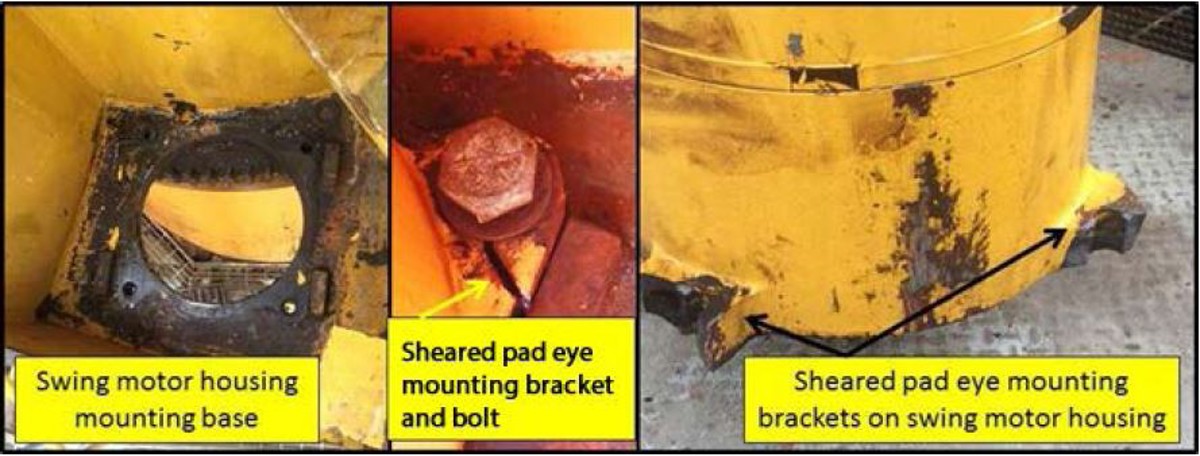A structural failure leads to uncontrolled motion of a ‘Billy Pugh’ basket and injuries to crew
- Safety Flash
- Published on 25 October 2017
- Generated on 7 February 2026
- IMCA SF 27/17
- 3 minute read
Jump to:
The United States Bureau of Safety & Environmental Enforcement (BSEE) has issued a bulletin about an incident in which a ‘Billy Pugh’ basket was subject to uncontrolled motion leading to three crew being injured.
What happened?
Four offshore personnel in the Gulf of Mexico were subject to uncontrolled motion while being transferred from a vessel to a production facility via the ‘Billy Pugh’ basket hoisted by a Titan model T5400B boom crane.
The boom began to swing due to the wind, and neither the swing brake lock nor attempts to reverse the swing stopped the uncontrolled motion.
The basket subsequently hit the railing on the vessel which caused injuries to three of the four offshore personnel.

What went wrong? What were the causes?
Investigation determined that the crane’s hydraulic swing gear motor (slew drive system) had failed, which made it impossible to control the lateral movement of the boom. The mounting pad eye brackets that secured the swing gear drive housing to the crane cab base had sheared, allowing the housing to deflect under loading and the swing gears to disengage from each other. The disengaged swing gears prevented any control of swing motion and effectively disabled the crane during the personnel lift. The BSEE investigation concluded the following:
- The mounting bolts either backed out during operations due to vibration or other operational causes, or the bolts were never fully tightened to torque specification when the crane was installed.
- The loose bolts allowed the swing gear motor mount to deflect under loading, which put unplanned stresses on the pad eye mounting brackets until the brackets sheared.
- Inspection of these bolts for any loosening and to insure the proper torque setting is not a normal part of daily pre-use, quarterly, or annual inspection(s) of the crane.
- Abnormal movement of the swing gear motor under loading, resulting from failure of the securing bolts or mounting brackets, may only be detectable by personnel looking for that specific failure.
What lessons were learned? What actions were taken?
BSEE recommended the following actions:
- Read the full BSEE Accident Investigation Report Incident Date 27 January 2017.
- Evaluate the condition of the mounting brackets and the torque values of the bolts securing the swing drive gear housing of cranes.
- Consider incorporating specific periodic examination (quarterly and/or annual inspections) of the crane swing drives, including pad eye connections and bolts.
- Review this incident with all personnel and organisations that work with crane operations, including crane personnel, crane contractors, crane manufacturers, riggers, and inspectors.
Related safety flashes
-
IMCA SF 03/13
30 January 2013
-
IMCA SF 03/00
1 July 2000
IMCA Safety Flashes summarise key safety matters and incidents, allowing lessons to be more easily learnt for the benefit of the entire offshore industry.
The effectiveness of the IMCA Safety Flash system depends on the industry sharing information and so avoiding repeat incidents. Incidents are classified according to IOGP's Life Saving Rules.
All information is anonymised or sanitised, as appropriate, and warnings for graphic content included where possible.
IMCA makes every effort to ensure both the accuracy and reliability of the information shared, but is not be liable for any guidance and/or recommendation and/or statement herein contained.
The information contained in this document does not fulfil or replace any individual's or Member's legal, regulatory or other duties or obligations in respect of their operations. Individuals and Members remain solely responsible for the safe, lawful and proper conduct of their operations.
Share your safety incidents with IMCA online. Sign-up to receive Safety Flashes straight to your email.